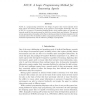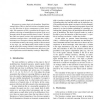1354 search results - page 143 / 271 » A Computational Model for a Cooperating Agent System |
CORR
2004
Springer
14 years 9 months ago
2004
Springer
FLUX is a programming method for the design of agents that reason logically about their actions and sensor information in the presence of incomplete knowledge. The core of FLUX is...
ATAL
2004
Springer
15 years 3 months ago
2004
Springer
We propose a context-logic style formalism, Timed Reasoning Logics (TRL), to describe resource-bounded reasoners who take time to derive consequences of their knowledge. The seman...
ESAW
2004
Springer
15 years 3 months ago
2004
Springer
In this paper we present analysis and calibration techniques that exploit knowledge about a multi agent society in order to calibrate the system parameters of a corresponding socie...
ATAL
2006
Springer
15 years 1 months ago
2006
Springer
Current computational trust models are usually built either on an agent's direct experience of an interaction partner (interaction trust) or reports provided by third parties...
ATAL
2006
Springer
15 years 1 months ago
2006
Springer
Distributing scarce resources among agents in a way that maximizes the social welfare of the group is a computationally hard problem when the value of a resource bundle is not lin...


